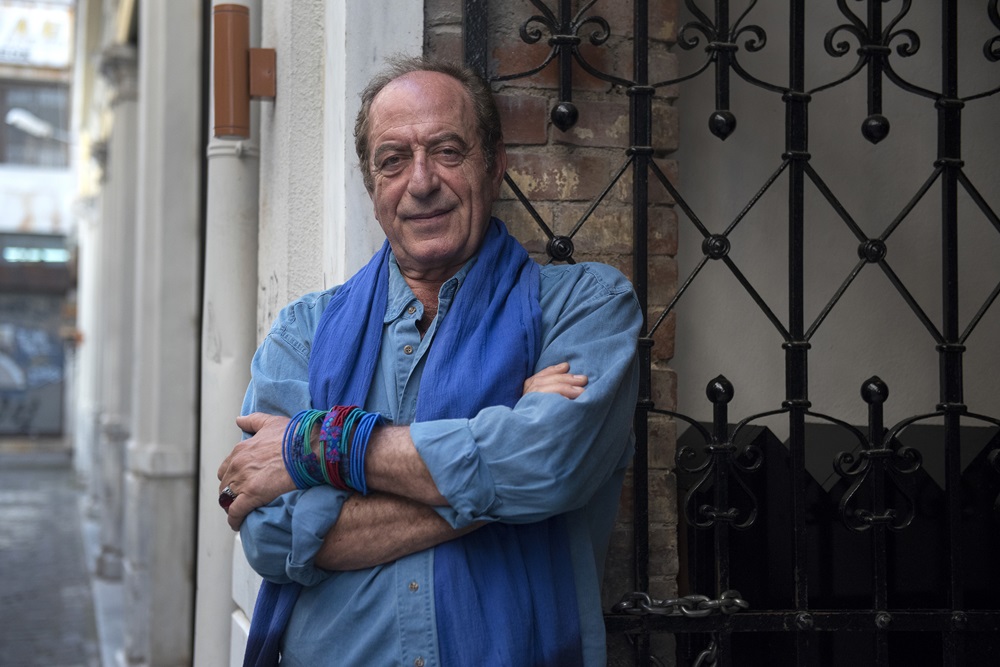
On the occasion of the publication of the lyrics of his Poems and Songs by Agra Publications, the important poet from Thessaloniki, Thomas Korovinis, comments on all those elements that run through his work. From the sense of collectivity and wandering, as a contemporary flâneur , he takes us on a journey from the markets of Constantinople to the straits of love, always maintaining a “discourse that is now becoming a memory of the past“.
Having served as a philologist in secondary education and lived for eight years in Constantinople, Thomas Korovinis highlights through his works all those things that connect the Greek and the Turkish nation, while he does not hesitate to criticize sharply our educational system regarding the devaluation of the Greek literature course. Nevertheless, he insists on maintaining a courageous view of life and a tender look at his fellow man.
Quite significantly, in my opinion, your new poetry collection begins with some poems dedicated to your musician colleagues. Ultimately, it’s the groups that write the history?
Conventional history is written by historians. With gradations of counterpoint to the truth. But the colour, the pulse, is given by individuals who escape the average and some groups who dare to be innovative, to confront the establishment and thus open new paths in society.
In your preface you seem to turn away from the “inhuman side of vagrancy” and to side with Elytis’ “young men with swollen feet”. How early in your poetic work did you choose where to direct your gaze?
I am a purely experiential creator, with a strong sociocentric disposition and an anti-establishment attitude. My wanderings, internally and on open roads, and years of observing the community have led my eye to this treatment of “sweet vagrancy”.
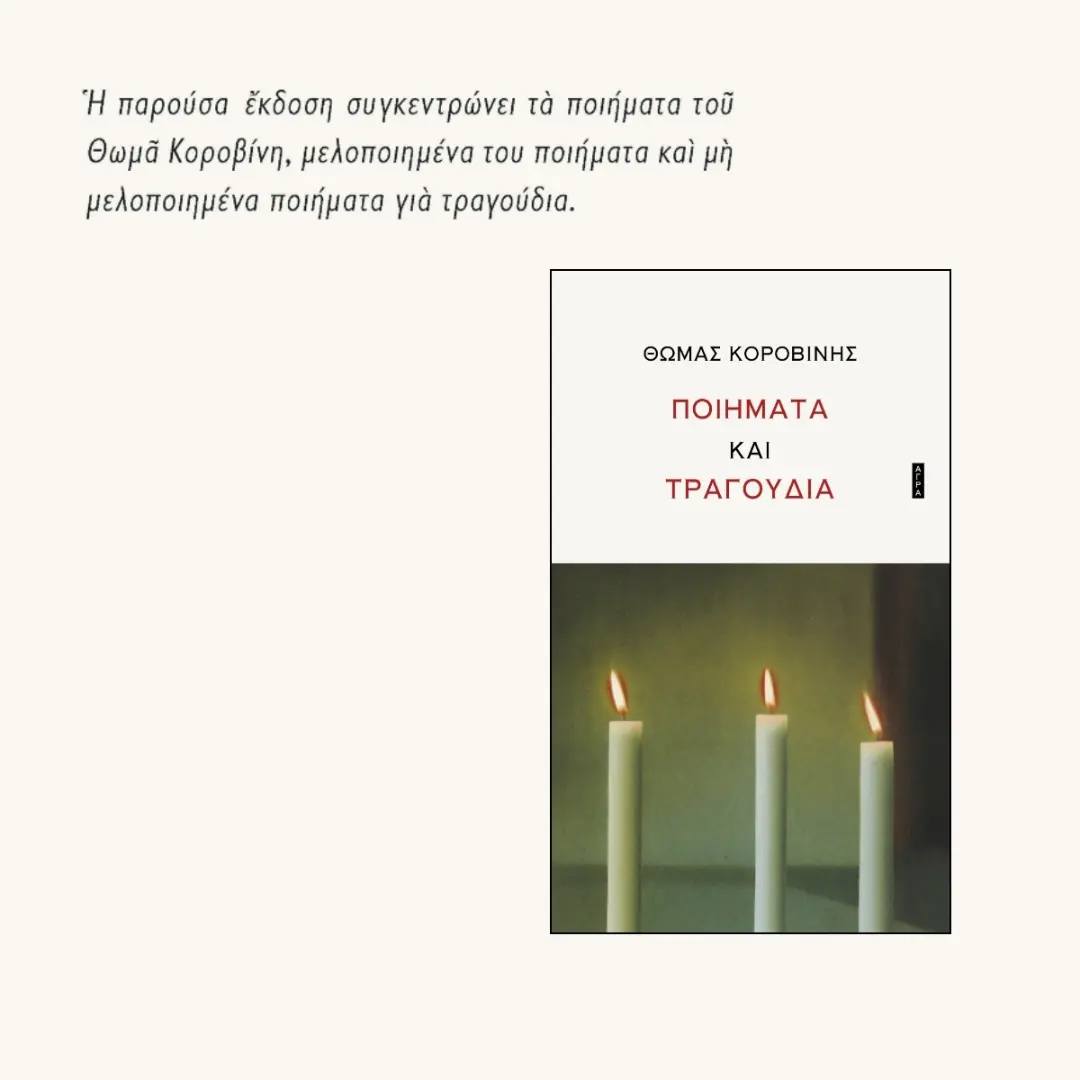
Poems and Songs, by Thomas Korovinis. Agra Publications
In the poem you dedicate to Pier Paolo Pasolini, you write: “For you who became a sacrifice for all orphan hearts, there was no heart left in Italy at that time.” Elsewhere you refer to contemporary refugeeism, to the murders of Grigoropoulos, Zak and Eleni Topaloudi. Is it not a timeless phenomenon that compassion does not prevail from person to person?
Inhumanity and ugliness are growing. It is our duty, “as long as there are human beings”, to point out the vulnerabilities that contribute to our brutalization and to counteract them by example.
In your poem “Eros, Eros, Eros makes me feel sick” you refer to love as the “enigma I have not solved”. At the same time, your friends know that you write lyrics and sing folk music. Is the melody a way of intuitively approaching the mysteries of love?
You put it well and the answer is “yes” but it is not possible for the member and poetry to cover this phenomenon that pervades existence, as a counterweight, so to speak, to the fear of death, a phenomenon that does not take a lifetime to discover its secrets, nor to live it to the full.

Bebis, by Thomas Korovinis. Agra Publications
Constantinople plays a leading role in many of your verses. “With your name on my lips I will die”. What elements make the two peoples like brothers?
Ostensibly, the common habits and customs due to their forced coexistence for centuries. But their intercommunication has not been helped by circumstances to come to any meaningful exchange. We still have a long way to go.
Much of your work focuses on aspects of popular culture and writing (profane proverbs, Canal d’amour, Karagiozis, rebetiko). Why do we observe that too often these aspects are silenced in academic literature and education? To what extent do folk myths, songs and proverbs determine the moral background of a nation?
The tradition of a nation underpins a fundamental part of its identity, that which mainly expresses the wisdom of memory and the special weight of its psyche. Academic opinion represents the official state, which neither identifies with nor expresses the people, and often even fights tradition. We are constantly impoverished as long as the proverb is no longer produced and the song has become accustomed to represent mainly our frivolity and lightness of spirit.
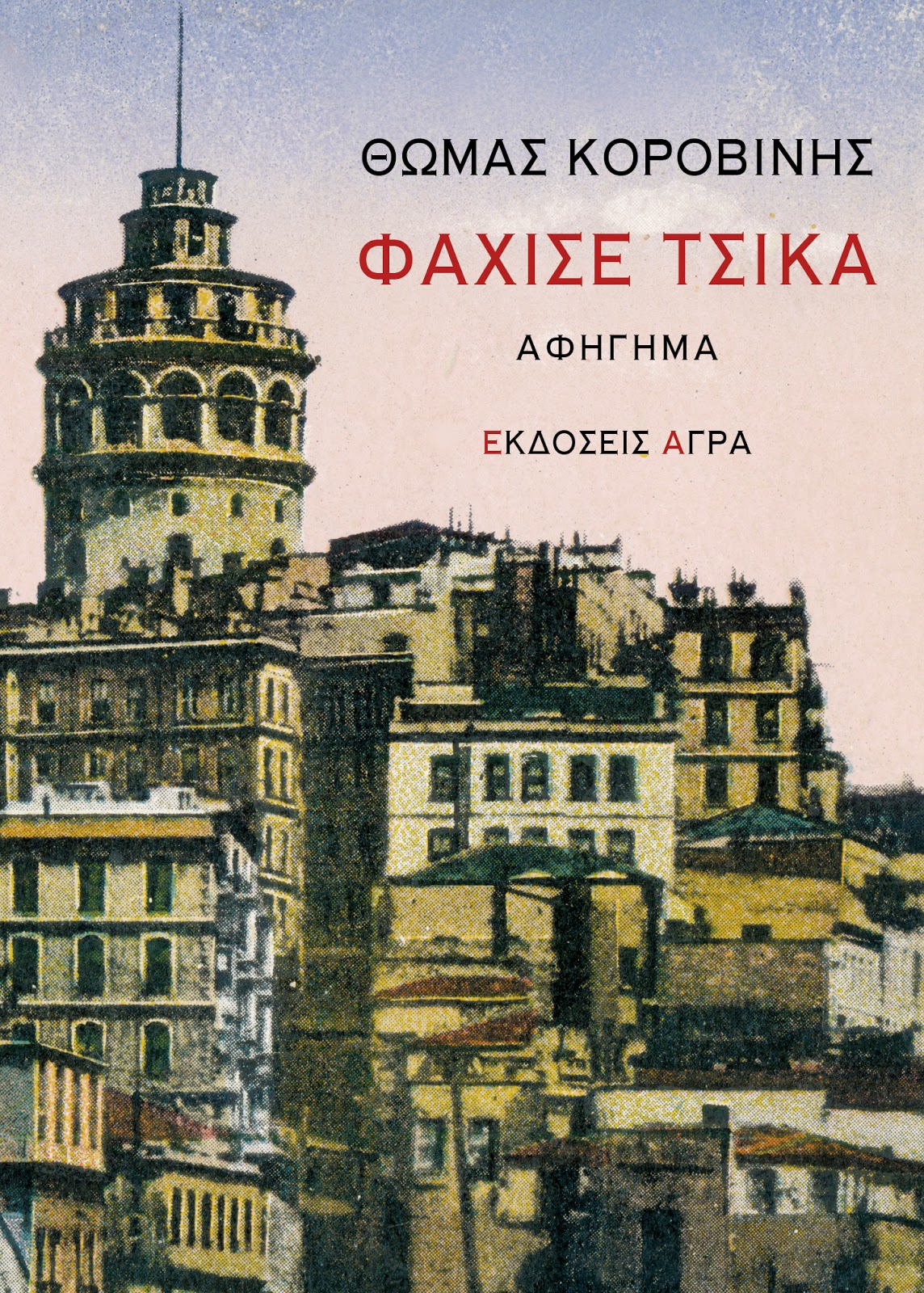
Fahişe Çika, by Thomas Korovinis. Agra Publications
To what extent have modern technological media supplanted the popular narrative?
The transition from a society that had begun half a century ago to gradually leave behind tradition in general – and especially the popular narrative – to a world where everything is determined by the adoption of technological means that propose a virtual reality was almost violently forced. Some creators like my own, few, creators, now seem like ghost-guardians of a discourse that is now becoming a memory of the past.
You have written fictional narratives, starring Papadiamantis, Viziinos, Cavafy, Odysseus Androutsos. Through this process have you and your students been able to better understand the actions and works of these great personalities?
Absolutely, but the main benefit comes from a different reading of the personalities and the times they lived in, which can bring a certain upheaval in the way we read history and our lives.
Your works such as Katadesmos and Round Death have been adapted for the theatre. How have your interactions with great actors of our time influenced your work? (Menti, Chatzipanagiotis, Ropa, Filippidou)?
I also have other people from the art world as conversationalists, such as Pantelis Voulgaris, Stelios Mainas, Filareti Komninou, Dimitris Piatas, Nikoletta Vlavianou, Elias Logothetis and others. I love our actors, because their closeness to our fellow human beings privileges their way of perceiving things, especially the more mature ones when they have a strong infrastructure. My life is mostly influenced by their friendship, not my art.
As a teacher, how did you experience the gradual devaluation of the course of literature in Greek education?
They are criminals. They contribute to the completion of ignorance and illiteracy and shoot the very essence of our identity, in this and other ways.
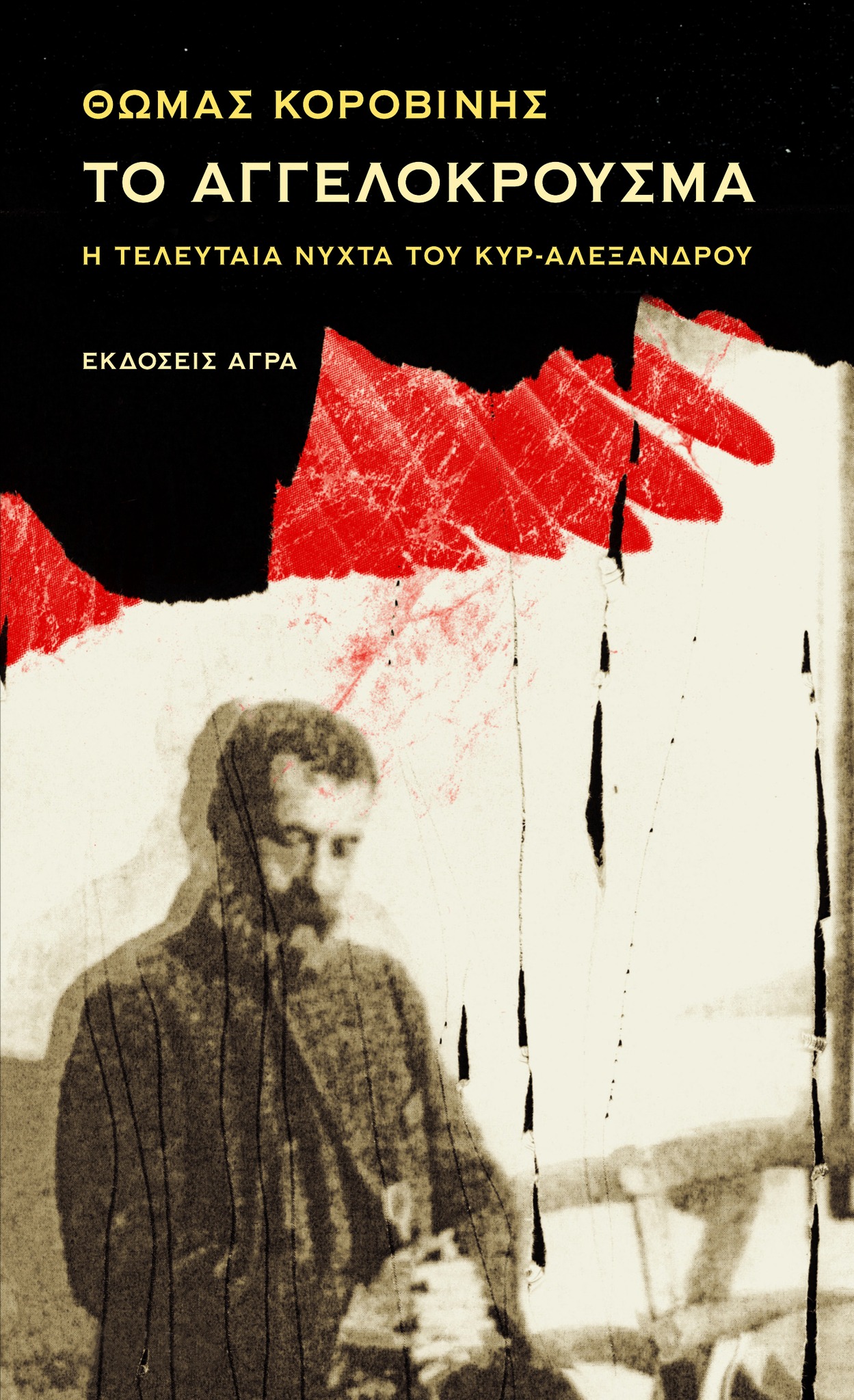
Death Throes-The last night of Mr. Alexander, by Thomas Korovinis. Agra Publications
“Cry and be quiet/ for go out and ask/ the beautiful audience,/one minute they throw you down/ and break you,/ the next they scream/ and lift you up/ to the sky”. You seem to be among those artists who don’t flatter their readers. What is the relationship with your readership?
Excellent. I have a very warm communication relationship. Because I am very particular, those who love and prefer me are my people.
What could modern Europe learn from the values of the East?
The need for simplicity and humility, the emotional education, the duty to be seen by Westerners as equal to the offer of help and the struggle for peace among nations.
In “Winners”, with lyrics like “you defeated us by setting up roadblocks / but you didn’t vanquish us” it seems that you oppose bravery and the spark of the soul against defeat. Is it a choice, after all, to face life with grit and courage?
It is purely an attitude towards life. As I’ve said before, “I have a stance and I don’t stand still.”
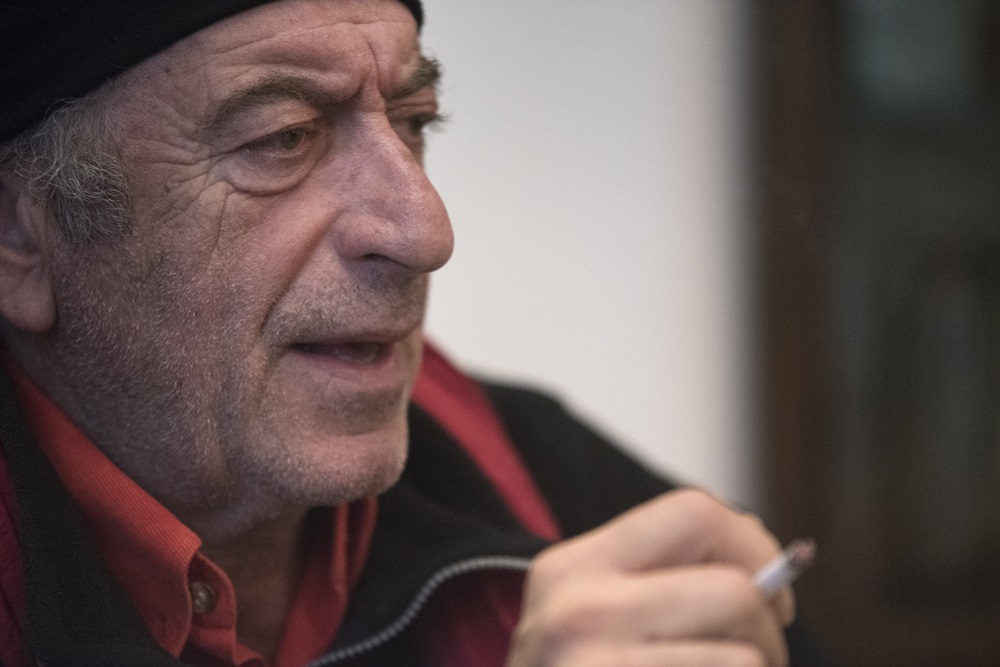
Portrait of Thomas Korovinis. “I have a stance and I don’t stand still”

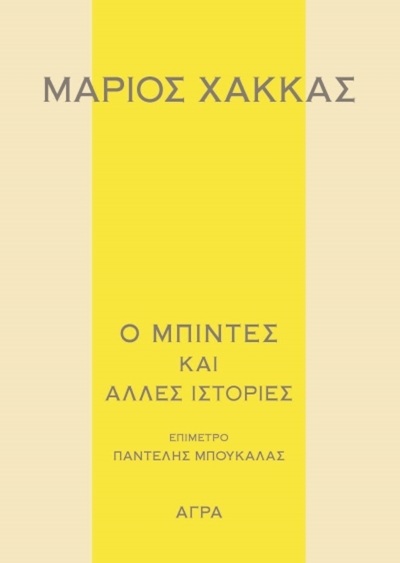
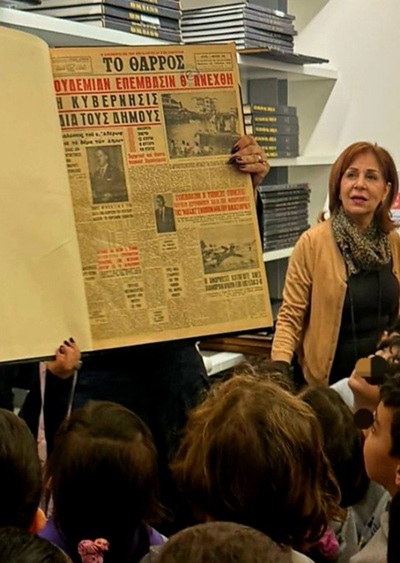
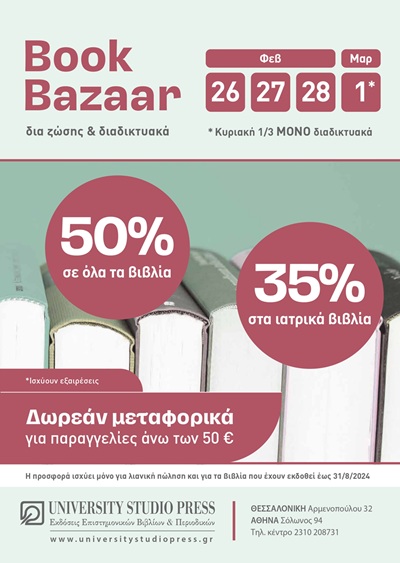



Leave A Comment